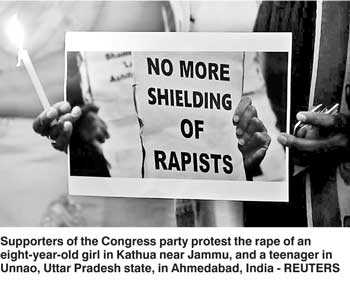Tuesday Feb 24, 2026
Tuesday Feb 24, 2026
Saturday, 22 September 2018 00:10 - - {{hitsCtrl.values.hits}}
 NEW DELHI (Thomson Reuters Foundation): India has launched its first national register of sex offenders in a bid to stem crimes against women as the country reels from a series of high-profile rape cases.
NEW DELHI (Thomson Reuters Foundation): India has launched its first national register of sex offenders in a bid to stem crimes against women as the country reels from a series of high-profile rape cases.
The database will be accessible only to law enforcement agencies and not to the public, with 440,000 names registered, including those convicted of rape, gang rape, child sex crimes and sexual harassment, according to a home ministry statement.
It will also provide their photos, addresses and fingerprints, without compromising “any individual’s privacy”.
“The National Database on Sexual Offenders (NDSO) ... will assist in effectively tracking and investigating cases of sexual offences,” the ministry said in the statement late Thursday.
The register comes as a spate of sexual assault cases have rocked the country, which was named the most dangerous in the world for women by experts in a survey published by the Thomson Reuters Foundation in June.
Earlier this week, police arrested the principal and four staff members of a boarding school in northern India over the rape of a teenage student. Police said they detained four male students for the rape, which left the girl pregnant. The school staff are accused of destroying evidence and covering up the crime.
In southern Kerala state, protests and calls grew this week for the arrest of a bishop accused of repeatedly raping a nun over a period of two years.
In August, police in northern Uttar Pradesh state rescued 20 girls and three boys from a home where they were sold for sex.
That raid came just weeks after police rescued nearly 30 girls who were sexually assaulted and tortured at a shelter in Bihar state.
The urgency to establish a sex offenders register gained momentum following nationwide outcry over the rape and murder of a Muslim girl in a Hindu-dominated area of Jammu and Kashmir state earlier this year.
The accused, all Hindus, are currently on trial.
The case prompted the government to approve the death penalty for the rape of girls under 12, and also increase the prison term for the rape of older girls and women.
Despite various measures, India’s rape epidemic has shown no sign of dying down. More than 100 cases were reported daily in India in 2016, the latest government data shows.